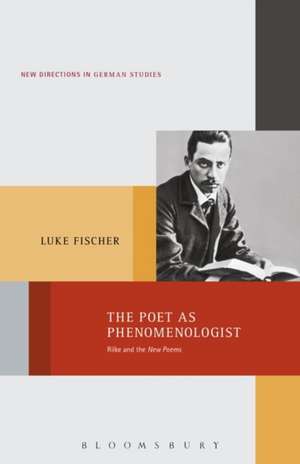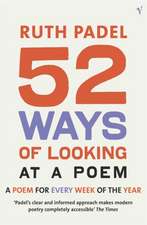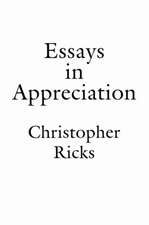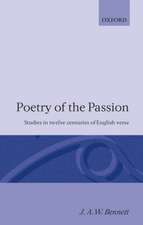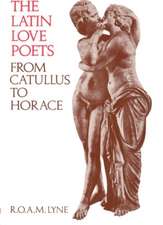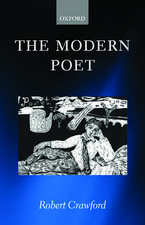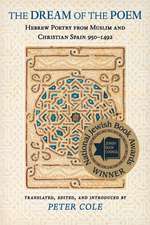The Poet as Phenomenologist: Rilke and the New Poems: New Directions in German Studies
Autor Dr. Luke Fischeren Limba Engleză Paperback – 7 sep 2016
Din seria New Directions in German Studies
- 14%
 Preț: 183.70 lei
Preț: 183.70 lei -
 Preț: 470.91 lei
Preț: 470.91 lei - 8%
 Preț: 145.46 lei
Preț: 145.46 lei - 11%
 Preț: 219.84 lei
Preț: 219.84 lei - 23%
 Preț: 190.50 lei
Preț: 190.50 lei -
 Preț: 169.04 lei
Preț: 169.04 lei -
 Preț: 217.09 lei
Preț: 217.09 lei - 7%
 Preț: 134.49 lei
Preț: 134.49 lei - 14%
 Preț: 183.24 lei
Preț: 183.24 lei -
 Preț: 217.62 lei
Preț: 217.62 lei - 21%
 Preț: 214.78 lei
Preț: 214.78 lei - 30%
 Preț: 718.85 lei
Preț: 718.85 lei - 22%
 Preț: 237.93 lei
Preț: 237.93 lei - 22%
 Preț: 225.77 lei
Preț: 225.77 lei - 22%
 Preț: 256.77 lei
Preț: 256.77 lei - 22%
 Preț: 225.41 lei
Preț: 225.41 lei - 23%
 Preț: 222.46 lei
Preț: 222.46 lei - 30%
 Preț: 714.12 lei
Preț: 714.12 lei - 30%
 Preț: 568.22 lei
Preț: 568.22 lei - 21%
 Preț: 218.36 lei
Preț: 218.36 lei - 11%
 Preț: 218.47 lei
Preț: 218.47 lei - 30%
 Preț: 569.94 lei
Preț: 569.94 lei - 21%
 Preț: 218.83 lei
Preț: 218.83 lei - 22%
 Preț: 256.20 lei
Preț: 256.20 lei - 14%
 Preț: 190.06 lei
Preț: 190.06 lei - 23%
 Preț: 197.14 lei
Preț: 197.14 lei - 13%
 Preț: 255.11 lei
Preț: 255.11 lei - 22%
 Preț: 226.79 lei
Preț: 226.79 lei - 30%
 Preț: 568.14 lei
Preț: 568.14 lei - 14%
 Preț: 191.85 lei
Preț: 191.85 lei -
 Preț: 183.24 lei
Preț: 183.24 lei -
 Preț: 231.81 lei
Preț: 231.81 lei - 22%
 Preț: 230.24 lei
Preț: 230.24 lei
Preț: 186.35 lei
Preț vechi: 215.26 lei
-13% Nou
Puncte Express: 280
Preț estimativ în valută:
35.66€ • 38.13$ • 29.73£
35.66€ • 38.13$ • 29.73£
Carte tipărită la comandă
Livrare economică 17 aprilie-01 mai
Preluare comenzi: 021 569.72.76
Specificații
ISBN-13: 9781501326035
ISBN-10: 1501326031
Pagini: 352
Dimensiuni: 140 x 216 x 25 mm
Greutate: 0.41 kg
Editura: Bloomsbury Publishing
Colecția Bloomsbury Academic
Seria New Directions in German Studies
Locul publicării:New York, United States
ISBN-10: 1501326031
Pagini: 352
Dimensiuni: 140 x 216 x 25 mm
Greutate: 0.41 kg
Editura: Bloomsbury Publishing
Colecția Bloomsbury Academic
Seria New Directions in German Studies
Locul publicării:New York, United States
Caracteristici
Makes a new contribution to phenomenological poetics in its argument that Rilke offers an exceptional response to the philosophical problem of dualism
Notă biografică
Luke Fischer (PhD, University of Sydney) is an independent scholar and award-winning poet. He has held post-doctoral fellowships and taught at universities in the U.S. and Germany and is an honorary associate in the philosophy department at the University of Sydney, Australia. His publications include the poetry collection Paths of Flight (2013), articles, translations, and poems in journals, anthologies, and edited volumes, as well as a book of bedtime stories (The Blue Forest, 2014). He won the 2012 Overland Judith Wright Poetry Prize, has been shortlisted for the Newcastle Poetry Prize, and was commended in the 2013 FAW Anne Elder Award for a first book of poems.
Cuprins
Introduction Chapter 1. Phenomenology and the Problem of Dualism Chapter 2. Learning to See: Rilke and the Visual Arts Chapter 3. Rilke as Seer: A Twofold Vision of Nature Chapter 4. The Neue Gedichte as a Twofold Imagining of Things Conclusion Epilogue BibliographyIndex
Recenzii
This thick volume's appeal will be limited to two small but intellectually impassioned audiences: scholars of the interrelations of philosophy and poetry in general and those specifically interested in Rilke as a philosophical poet in the tradition of Hölderlin . Fischer's command of the vast secondary literature of his chosen fields is remarkable. The author does a good job reminding readers of what has been covered as the text moves along . A remarkable effort of great erudition and insight, this book will find a place in the field of phenomenology of literary aesthetics as well as Rilke studies. Summing Up: Recommended. Graduate students and researchers.
Fischer manages expertly to balance a compelling theoretical interpretation of Rilke's New Poems with all the sensitivity to form of a practitioner . By reading Rilke's New Poems as a form of phenomenology in their own right, Fischer performs the original hermeneutic task of proceeding from the unity of what is actually being said, to explain what the poem wishes to say. He does so with an exquisite attention to form that offers compelling new readings of Rilke's work. As such, The Poet as Phenomenologist makes a substantial and original contribution to scholarship on Rilke as a "philosophical poet" . as well as to broader attempts . to break down the dichotomy between literature and philosophy in German letters.
Fischer, as a poet himself, comes into his own when he writes about [Rilke's] poems ... [A] fresh reading of Rilke as a poet who evokes the world we are in and belong to, rather than are alienated from and trying to escape.
Luke Fischer focuses on Rilke's 'diligence and devotion' to seeing phenomena as suffused with meaning and to embodying this seeing in enabling words. He traces the development of Rilke's poetic practice to his encounters with Cézanne, Rodin, and Jakob von Uexküll's Umwelt theory, and in close readings he elucidates the disclosive powers of some of the major poems in Rilke's Neue Gedichte. The result is a compelling demonstration of the ability of Rilke's poetic art to capture meanings in the world in a way that recovers an understanding of distinctively human attentive being within nature. This is vital work for anyone concerned with poetry and the fate of the human.
While the New Poems have already been the subject of much critical inquiry and commentary, Fischer makes the case for reading them freshly. . This is a cogent and enlightening volume that brings a new, systematic and thoughtful set of perspectives to the understanding of Rilke's New Poems.
Like Hölderlin, Rainer Maria Rilke has long been viewed as a 'philosophical poet' and has, therefore, held a special fascination for philosophers. Luke Fischer's book is situated in this context. It examines Rilke's relation to phenomenology, and is chiefly concerned with Rilke's significance for an overcoming of dualism, especially in the period of the New Poems. With this book Fischer has made a substantial contribution both to Rilke scholarship and to phenomenological research.
How might philosophy become more like poetry? This is precisely the question at the heart of Luke Fischer's The Poet as Phenomenologist ... [A] valuable addition to Rilke scholarship in English, particularly for its careful and comprehensive analysis of Rilke's poetics of vision.
Fischer manages expertly to balance a compelling theoretical interpretation of Rilke's New Poems with all the sensitivity to form of a practitioner . By reading Rilke's New Poems as a form of phenomenology in their own right, Fischer performs the original hermeneutic task of proceeding from the unity of what is actually being said, to explain what the poem wishes to say. He does so with an exquisite attention to form that offers compelling new readings of Rilke's work. As such, The Poet as Phenomenologist makes a substantial and original contribution to scholarship on Rilke as a "philosophical poet" . as well as to broader attempts . to break down the dichotomy between literature and philosophy in German letters.
Fischer, as a poet himself, comes into his own when he writes about [Rilke's] poems ... [A] fresh reading of Rilke as a poet who evokes the world we are in and belong to, rather than are alienated from and trying to escape.
Luke Fischer focuses on Rilke's 'diligence and devotion' to seeing phenomena as suffused with meaning and to embodying this seeing in enabling words. He traces the development of Rilke's poetic practice to his encounters with Cézanne, Rodin, and Jakob von Uexküll's Umwelt theory, and in close readings he elucidates the disclosive powers of some of the major poems in Rilke's Neue Gedichte. The result is a compelling demonstration of the ability of Rilke's poetic art to capture meanings in the world in a way that recovers an understanding of distinctively human attentive being within nature. This is vital work for anyone concerned with poetry and the fate of the human.
While the New Poems have already been the subject of much critical inquiry and commentary, Fischer makes the case for reading them freshly. . This is a cogent and enlightening volume that brings a new, systematic and thoughtful set of perspectives to the understanding of Rilke's New Poems.
Like Hölderlin, Rainer Maria Rilke has long been viewed as a 'philosophical poet' and has, therefore, held a special fascination for philosophers. Luke Fischer's book is situated in this context. It examines Rilke's relation to phenomenology, and is chiefly concerned with Rilke's significance for an overcoming of dualism, especially in the period of the New Poems. With this book Fischer has made a substantial contribution both to Rilke scholarship and to phenomenological research.
How might philosophy become more like poetry? This is precisely the question at the heart of Luke Fischer's The Poet as Phenomenologist ... [A] valuable addition to Rilke scholarship in English, particularly for its careful and comprehensive analysis of Rilke's poetics of vision.
